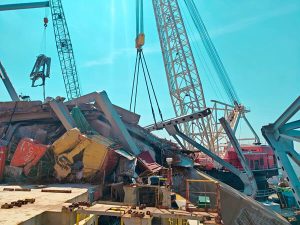By Leo Ryan, Editor
For only the second time since it was established in 1959, the St. Lawrence Seaway, a vital bi-national corridor linking the Atlantic Ocean to the industrial heartland of North America, has been shut down due to a strike by Seaway workers.
Some 361 workers in Ontario and Quebec began a strike on Sunday at 00.01 am after negotiations failed to meet a union-imposed deadline with Canada’s St. Lawrence Seaway Management Corporation (SLSMC). The first such work stoppage in 1968 idled 300 vessels for 24 days at an estimated cost of $20 million in wages, Seaway tolls and other losses. The work stoppage stirred a big cry of alarm not only from Canadian marine industry and business circles but also from U.S. Great Lakes ports urging the federal government to intervene.
According to the SLSMC, currently there are no vessels waiting to exit the system, but there are over 100 vessels outside the system, which are impacted by the situation.
“The parties are at an impasse as UNIFOR (union representing Canadian Seaway workers) continues to insist on wage increases inspired by automotive-type negotiations, while the SLSMC works to find a fair and competitive labour agreement that balances wage demands and market realities, “ the SLSDMC said today.
As a result, the system will remain shut down until an agreement can be reached, whether it be temporary or tentative, as we work diligently to minimize disruption for all stakeholders. The existing collective agreement expired on March 31, 2023.
“The stakes are high, and we are fully dedicated to finding a resolution that serves the interests of the Corporation and its employees. We remain committed to continuing discussions and reaching a fair labour agreement,” stated Terence Bowles, SLSMC President and CEO. “In these economically and geopolitically critical times, it is important that the Seaway remains a reliable transportation route for the efficient movement of essential cargoes between North America and the remainder of the world.”
The SLSMC is awaiting a response to its Canada Industrial Relations Board application, seeking a ruling under the Canada Labour Code for the Union to provide employees during a strike to ensure vessels engaged in the movement of grain continue transiting the system.
An orderly shutdown of the system took place during the 72-hour notice period allowing for vessels to safely clear the Seaway system, and the Corporation remains in regular contact with the marine industry.
The SLSMC is awaiting a response to its Canada Industrial Relations Board application, seeking approval as allowed under the Canada Labour Code for ships engaged in the movement of grain to continue transiting the system during the work stoppage.
In a statement today, the Montreal Port Authority said the Great Lakes and St. Lawrence River maritime ecosystem serves 75 per cent of the country’s manufacturing capacity and nearly two-thirds of the Canadian population.
“Any interruption or breakdown of services in the supply chains undermines the resilience of the economy, both regionally and nationally,” said port spokesperson Renée Larouche.
The Montreal Port Authority is calling on all parties to find a rapid solution to “limit the negative impact, both on the companies that rely on these goods and on Canada’s reputation as a trading partner.”
“The Seaway has a long and respected reputation for reliability in its operations, and is a key conduit for commodities that support our quality of life, so it is the marine industry’s natural expectation that the Seaway will resolve this matter with minimal disruption, and with the support of the Government of Canada, if needed,” said Bruce Burrows, President and CEO of the Chamber of Marine Commerce
The Canadian Federation of Independent Business (CFIB) expressed concern about the strike’s impact on small and medium-sized enterprises (SMEs), especially after they were severely affected by last July’s strikes at British Columbia’s ports.

Serious impact on supply chains
While respecting the right to collective bargaining, CFIB said “Canada’s economy and our supply chains cannot afford another strike.”
On Friday, the American Great Lakes Ports Association sent a letter urging Canada’s Minister of Transport, Pablo Rodriguez, and Labor Minister Seamus O’Reagan to help resolve the conflict and prevent a disruption to commerce that would have “disastrous impacts.”
If the strike extends for more than a few days, industry observers expect pressures to escalate for the federal government to introduce back-to-work legiuslation.
Among other points raised, the AGLPA made reference to “a 2020 analysis of mid-season closure scenarios which shows that a two-week closure would result in the loss of 19,227 jobs; a five-week closure would result in the loss of 21,046 jobs; and an 8- week closure would result in the loss of 22,144 jobs.”
“Beyond the immediate economic impacts, we fear the looming work stoppage will damage the record of reliability that users of the system have come to depend upon. As an inland transportation system, the Seaway competes with other modes of transportation such as rail and trucking. Further, the Seaway system competes with the U.S. inland river barge system. In these ways, supply chain managers have options, and they will make transport decisions based on cost and reliability,” the AGLPA said.
Unifor National President Lana Payne expressed her disappointment in the failure of the employer to make serious movement in the past two days, saying: “This impasse is extremely unfortunate but our members remain committed to getting a fair agreement.”
Unifor Quebec Director Daniel Cloutier emphasized the negotiating committee’s ongoing commitment to constructive dialogue and said, “We negotiated in good faith right up to the last moment, but we cannot allow workers’ rights to be compromised. We remain open to discussion and hope that the employer will reconsider its position for the good of all.”
(Unifor photos of picket lines at the St. Lambert and Iroquois locks on the St. Lawrence River)





